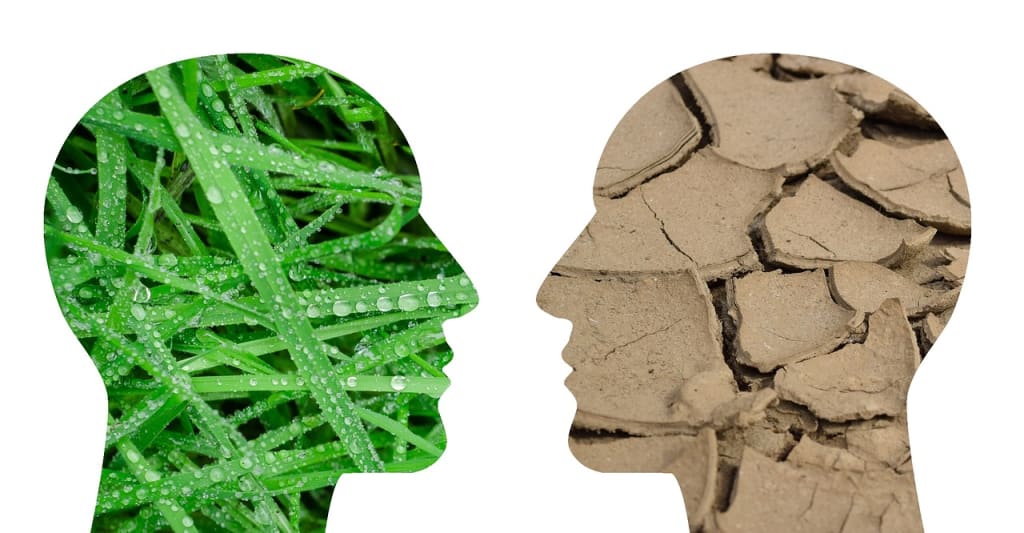Friends on Fire: A Climate Change Debate
Clash Between a Climate Advocate and a Climate Doubter

Lila and Omar were best friends since childhood, but they had very different views on climate change. Lila was a climate activist who believed that humans were responsible for causing global warming and environmental degradation.
Omar was a climate skeptic who doubted the scientific evidence and thought that humans had little or no impact on the planet.
One day, they decided to have a friendly debate on the topic, hoping to persuade each other of their opinions. They met at a cafe and ordered their drinks.
"Okay, let's start with the basics," Lila said. "Do you agree that the Earth is warming up?"
"Sure, I agree that the Earth is warming up, but that's natural. The Earth has always gone through cycles of warming and cooling. It's not caused by humans," Omar replied.
"That's not true. The Earth is warming up faster than ever before, and it's because of human activities. We have increased the concentration of greenhouse gases in the atmosphere, such as carbon dioxide and methane, by burning fossil fuels, deforestation, agriculture, and other sources. These gases trap heat and cause the greenhouse effect, which raises the global temperature," Lila explained.
"How do you know that? What's your source of information?" Omar asked.
"I know that from the scientific reports and studies that I have read and researched. For example, the Intergovernmental Panel on Climate Change (IPCC), which is the leading international body for the assessment of climate change, has stated that it is extremely likely that human influence has been the dominant cause of observed warming since the mid-20th century.
They have also projected that the global average temperature will rise by 1.5°C to 4.5°C by the end of the century, depending on the emission scenarios," Lila answered.
"That's just a theory. There is no conclusive proof that greenhouse gases cause global warming. Other factors influence the climate, such as solar activity, volcanic eruptions, ocean currents, and natural variability.
The climate models are unreliable and overestimate the warming. The scientists are biased and corrupted by political and economic interests. They manipulate the data and ignore the uncertainties and errors," Omar argued.
"That's nonsense. There is overwhelming scientific consensus that greenhouse gases cause global warming. The evidence is clear and consistent from multiple sources, such as temperature records, ice cores, tree rings, satellite observations, and paleoclimate studies.
The climate models are based on well-established physical laws and validated by empirical data.
The scientists are rigorous and transparent in their methods and are peer-reviewed by their colleagues. They acknowledge the uncertainties and errors, but they also show the confidence and range of the projections," Lila countered.
"Can you give me some examples of the evidence and the sources?" Omar challenged.
"Sure, I can. For example, the temperature records from thousands of weather stations around the world show that the global average surface temperature has increased by about 1.1°C since the late 19th century.
The ice cores from Antarctica and Greenland show that the atmospheric concentration of carbon dioxide has increased by about 40% since the pre-industrial era and that this is the highest level in at least 800,000 years.
The tree rings from different regions of the world show that the recent decades have been the warmest in the past millennium. The satellite observations show that the Arctic sea ice extent has declined by about 13% per decade since 1979.
The paleoclimate studies show that the current rate of warming is unprecedented in the past 10,000 years," Lila listed.
"Okay, fine. Let's say that greenhouse gases cause global warming. So what? It's not a big deal. The Earth can adapt to the changes. The warming will bring some benefits, such as longer growing seasons, more rainfall, and more plant growth.
The humans can also adapt to the changes. We have the technology and innovation to cope with the challenges.
We can use renewable energy, geoengineering, and adaptation strategies to mitigate the impacts. We don't need to sacrifice our development and prosperity for the sake of the environment," Omar said.
"That's a dangerous and irresponsible attitude. The warming is a big deal. The Earth cannot adapt to the rapid and unprecedented changes. The warming will bring many risks, such as melting glaciers, rising sea levels, extreme weather events, droughts, floods, wildfires, and heat waves.
Humans cannot adapt to the severe and widespread impacts. We will face the consequences of food insecurity, water scarcity, health problems, biodiversity loss, social unrest, and economic losses. We need to act urgently and decisively to reduce our emissions and protect the environment," Lila said.
"Can you give me some examples of the risks and the impacts?" Omar asked.
"Sure, I can. For example, the melting glaciers will contribute to the sea level rise, which will threaten the coastal communities and the low-lying islands.
The sea level rise will also increase the risk of storm surges, coastal erosion, saltwater intrusion, and flooding.
Extreme weather events, such as heat waves, droughts, floods, and hurricanes, will become more frequent and intense, causing deaths, injuries, diseases, and displacement.
The droughts and floods will also affect the crop production and the food security, especially in the developing countries.
The wildfires will destroy the forests and the habitats, releasing more carbon dioxide and reducing the carbon sinks.
The heat waves and air pollution will increase the risk of respiratory and cardiovascular diseases, especially for the elderly and children.
The biodiversity loss will reduce the ecosystem services and resilience, affecting human well-being and livelihoods.
The social unrest and the economic losses will result from the conflicts, migrations, and inequalities, caused by the scarcity of resources and the unequal distribution of impacts," Lila explained.
They continued to debate for a long time, but neither of them could convince the other. They realized that they had very different perspectives and values and that they were influenced by different sources of information and misinformation.
They agreed to disagree, but they also agreed to respect each other's opinions and remain friends. They finished their drinks and left the cafe, hoping that one day they would find a common ground on the issue of climate change.
After reading the story of Lila and Omar, which side are you on?
Do you agree with Lila, the climate activist, who believes that humans are causing global warming and that we need to take action to protect the environment?
Or do you agree with Omar, the climate skeptic, who doubts the scientific evidence and thinks that humans have little or no impact on the planet?
About the Creator
Shoaib Shahid
HSE pro by day, night storyteller. I write fiction, shorts, and stories with self-discovered lessons—just a storyteller.
Enjoyed the story? Support the Creator.
Subscribe for free to receive all their stories in your feed. You could also pledge your support or give them a one-off tip, letting them know you appreciate their work.






Comments
There are no comments for this story
Be the first to respond and start the conversation.